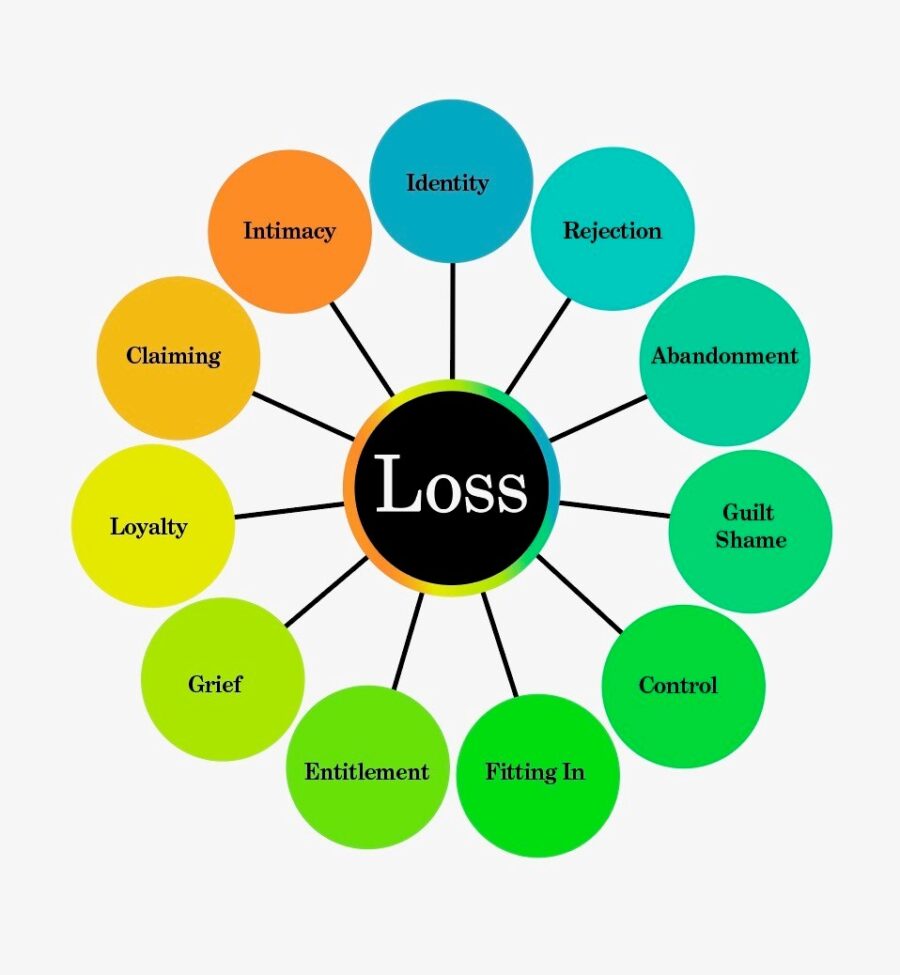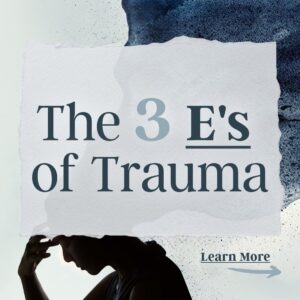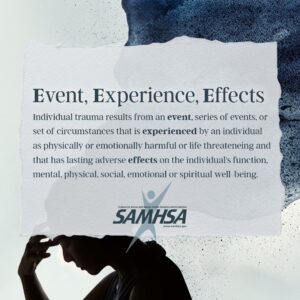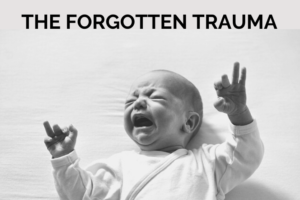Introduction to the Core Issues of Adoption
The seven core issues of adoption paradigm is the most taught adoption paradigm because it unpacks the complexities of the lived adoption experiences of birth parents, adoptees, and adoptive parents. In 1982 Sharon Kaplan Roszia and Deborah Silverstein, the authors of the core issues of adoption challenged the notion that adoption was only positive and emphasized that adoption only happened because of adoption losses. When Roszia and Silverstein wrote about the seven core issues of adoption it was groundbreaking due to society’s belief that adoption was a “win-win” for all involved and that adoptive parents should raise their child “as if” they were born to them. They asserted that while adoption could bring joy to many adoptive families, adoption only happens because of relinquishment and adoption losses. Roszia and Silverstein believe the adoption losses caused six additional core issues: grief, rejection, identity, guilt/shame, intimacy, and control/mastery. They stated when adoption triad members struggle with the core issues, it is a normative response to their adoption experiences.
Roszia and Silverstein conceptualize the core issues as a wheel with loss in the center and the additional core issues of grief, identity, rejection, guilt/shame, control/mastery, and intimacy stemming from the losses. They believed how much an individual struggles with the core issues depends upon their personality and lived experience. The adverse relinquishment and adoption experiences assessment is a detailed list of difficult life experiences that have a lasting impact on adoption triad members. There are times in an adoption triad member’s life when things occur that can intensify a core issue(s). Two examples are an adoptee becoming a parent or adoption reunion contact between an adoptee and their birth family. Roszia and Silverstein’s writings discussed that not only are the adoption triad members (adoptee, birth parent, adoptive parent) impacted by the adoption losses, but their extended family members are impacted too. The core issues of adoption are intergenerational.
After reading the research and talking to adoption triad members and adoption professionals, Marie believes the original seven core issues should be expanded to include five additional core issues: abandonment, claiming, loyalty, entitlement, and fitting in. Marie also believes the core issues are not solely a response to the losses, the core issues are a response to how society, adoption laws and practices, adoption professionals, and individuals have treated adoption triad members.
The Core Issues of Adoption as a Trauma Paradigm
While the original writings of the core issues adoption did not refer to the core issues as a trauma paradigm, if you unpack the core issues with a trauma-focused lens, it helps to understand the depth of the adoption triad member’s struggles. The extensive stress of adoption trauma experiences changes an individual’s view of themselves and their world. Long after the relinquishment and adoption traumatic events have passed an individual’s brain and body react as if their traumatic experiences are happening in the present. New encounters are viewed through the lens of the traumatic experience[1].
The core issues – loss, rejection, grief, identity, control, intimacy, guilt/shame, entitlement, abandonment, fitting-in, loyalty, and claiming struggles are the trauma symptoms caused by the adoption traumas impacting how a person views themselves and their world in the present.
We know from the research on trauma, that the big T traumas and the little t traumas have a compounding effect on a person[2]. The little t traumas of psychological abuse and acts of omission often have a more damaging effect on a person because the source of the trauma was a loved one. An example of a little t trauma having a traumatic impact on an adoptee or birth parent is when their family members act as if the adoption never happened. This results in traumatic isolation with no support for the losses and other core issues. The Substance Abuse and Mental Health Services Administration’s 3 Es of Trauma helps to understand why some adoption triad members are less impacted by the core issues and other adoption triad members are traumatized by their relinquishment and adoption experiences. The 3 Es of Trauma is outlined in the paragraph and graphic to the right. Youth with multiple trauma symptoms could develop developmental trauma disorder[3]. Adults with multiple trauma symptoms could develop post-traumatic stress disorder or complex post-traumatic stress disorder[4].
The core issues struggles should be viewed as having a cumulative effect on a person. Just like the Adverse Childhood Experiences assessment evaluates the cumulative effect of difficult and traumatic experiences on a person, an adverse relinquishment and adoption experiences assessment can be done by identifying all of the trauma experiences and struggles with loss, grief, identity, rejection, shame/guilt, mastery/control, intimacy, abandonment, loyalty, claiming, entitlement, and fitting- in.
3 Es of Trauma Applied to Adoption Traumas
The 3 E’s of trauma -Event, Experience, Effect- help to explain why some individuals experience a lesser impact of adoption experiences and other individuals have trauma symptoms. Event includes the number of adverse relinquishment and adoption events. Other traumas -epigenetic traumas, parents with attachment problems, psychological abuse, physical abuse, sexual abuse, racial traumas, daily living traumas (homelessness, unsafe neighborhood)- in addition to adoption traumas have a compounding effect resulting in a greater number and severity of trauma symptoms. Experience includes the severity of the trauma event and the availability of support when the trauma occurred. An example is an adoptee who is a person of color raised by white parents will have a different experience than if they had been adopted into a family of their race/ethnicity. Having supportive people who acknowledge an individual’s narrative and support their pain without judgment can help lessen the intensity of trauma symptoms. Experience includes how a person labels and assigns meaning to their experiences. If an adoption triad member feels shame, it can intensify the trauma symptoms. Conversely, self-compassion can lessen trauma symptoms. The Effect is the resulting trauma symptoms that impact self-worth, capabilities, and relationships.
Healing the Core Issues of Adoption
Healing from the core issues can be complex because of the years the core struggles have been experienced and the losses do not go away. Recovery is harder for individuals with childhood traumas and multiple trauma experiences. The research on healing from trauma recommends in addition to trauma-focused therapy, the following may help with healing.
Speaking Your Truth
For decades individuals have been expected to not talk about their feelings and how they have been impacted by relinquishment and adoption. This results in individuals learning to distance themselves from their voice. For some, it is an amnesia reaction to interpersonal betrayal trauma[5]. Individuals forget how they were treated and how they felt due to it being too painful to remember while in a relationship with the hurtful person. Learning to speak your truth takes the power away from the secrets. Individuals are no longer at war with their inner self because they are not using their emotional energy to suppress their feelings and thoughts. It is a decision to say their emotional well-being is important. When an individual speaks their truth, it can decrease shame because their narrative acknowledges how people and their environment impacted them. Speaking your truth can be done by acknowledging your experience to yourself, a trusted person, or writing down your thoughts.
Psychoeducation on adoption and trauma
Learning about adoption issues and how trauma changes the brain and body provides a framework for understanding that the core issues and trauma symptoms are a normative response to what an individual has experienced. Education can help to reduce shame and improve self-compassion. Psychoeducation can be reading books (historical narratives, memoirs. research), podcasts, attending an adoption conference, and psychotherapy.
Self-Compassion
The research on trauma has shown that reducing shame can help to decrease the symptoms of post-traumatic stress disorder[6]. For individuals who have moral injury[7] (a syndrome characterized by trauma-related guilt and shame as a result of the trauma being a result of going against one’s beliefs) self-compassion can be a complex challenge. Our lives do not operate in a vacuum. There are family influences, intergenerational patterns, societal influences, business of adoption, and individuals who were not supportive. Individuals are impacted by a lack of resources. Professionals involved in the business of adoption rarely offer comprehensive information on the impact of relinquishment and adoption. Family member’s issues often took president over what an adoption triad member wanted/needed. Nor was adequate education and supportive services available in most situations. Self-compassion includes being kind to yourself after all you have been through.
Finding Community
Without having a natural support system that understands negative adoption experiences, many individuals will benefit from connecting to the adoption community. Research has shown that supportive, validating relationships can help to heal interpersonal trauma. Options for finding community include support groups, attending an adoption conference, or attending an event (in-person or virtual) hosted by an adoption organization. Many individuals have also benefited from listening to podcasts. What is important is to find others who understand what you have been through and can validate your pain. If you are interested in a support group and live in the Albany, NY area visit Marie’s adoption support group webpage to learn more about the support groups she hosts.
Grief Work
The joyful spin of adoption mitigates the grief. The grief can be enormous due to the number and depth of the losses. When family, friends, and society do not acknowledge the losses, the losses are ambiguous losses[8] and the grief disenfranchised grief. There were no ceremonies to acknowledge the loss of the child not staying in the family. When grief is not mourned, it can resurface and be overwhelming when triggered. The grief does not completely go away, because the losses do not go away. For some there will always be triggers for the grief -birthdays, Mother’s Day, anniversary of events as well as extra sensitivity to other losses -death, moves, divorce.
The goal of grief work is to reduce the intensity of the grief. Writing in a journal, a letter to a younger self, or a conversation you would like to have had can help to give voice to the sadness. Some have honored their losses by making a collage or a loss box with mementos and pictures of what has been lost. Finding someone who understands and can hold your sadness may help. Family members often have their own issues which can complicate the support needed for the long process of grief work. What is key is to let your grief out so the losses can be acknowledged, and the intensity of the grief can be lessened.
Stress Management Techniques
Adoption traumas can cause an everyday normative state of high stress. Then when a stressful event happens, it can cause a person to overact or shut down due to a small window of tolerance for stress. Research has shown that healing from trauma requires more than talking about traumatic experiences. Healing from trauma includes becoming aware of the inner experience and learning to ground oneself in the present when triggered by the past. To learn more about stress management techniques, visit the Stress Management Techniques for Healing Trauma blog post.
Developing a Positive Identity
It is a normative response to have low self-worth because of the enormity of experiences. Individuals often spend years being a chameleon, a people pleaser, or a perfectionist as a response to difficult life experiences. This results in a person distancing themselves from their voice, beliefs, interests, and values. Shame is a normative response to how an individual has been treated. It is not the identity of an individual.
Adopted persons who are a different race/ethnicity from their adoptive parents often struggle to have a racial/ethnic/cultural identity that matches their family of origin (birth family). This is a normative result of being raised by white parents in a white community. Developmentally children will identify with the parents if they have not interacted with and been mentored by individuals of their race/ethnicity. Reculturation is the process of learning and identifying with the race/ethnicity/culture of your family of origin[9].
Building self-worth starts with believing “I can be true to myself”. It includes internalizing that your identity is not your struggles. Individuals will need to move past survival mode to learn how to read their body’s cues to identify their feelings, thoughts, and values. This includes acknowledging strengths and accomplishments. It says my identity is not how others define me. It is claiming and loving yourself for who you are.
Conclusion
This blog post is a short overview of the core issues of adoption. A comprehensive discussion of the 12 core issues and counseling for the core issues of adoption would be a two-hour presentation. The resource list below has information on the original core issues articles written by Deborah Silverstein and Sharon Kaplan Roszia. Also, on the resource list are two books recently written by Sharon Kaplan Roszia and Alison Davis Maxon on the core issues of adoption. The strengths of the books are more detailed information on the seven core issues of adoption, exercises to help with healing and, there are chapters on specific family situations-multiracial family, single family, and kinship family. The books primarily focus on adopted youth and their families and not birth parents or adult adoptees. Individuals who would like to learn more about healing from the core issues of adoption could benefit from learning about complex trauma and treatment. The research on complex trauma treatment is adaptable to relinquishment and adoption traumas.
The core issues of adoption are the fallouts of adoption losses and traumas. Every adoption triad member has their own unique journey. Thus, they will need to make sense of how relinquishment and adoption impacted them. It is the hope of this blog post that there will be more understanding and compassion for adoption triad members and all they have been through.
Footnotes
[1] van der Kolk, B., (2014). The Body Keeps the Score, Viking
[2] Shapiro, F., (2018). Eye Movement Desensitization and Reprocessing (EMDR) Therapy: Basic Principles, Protocols, and Procedures 3rd edition, The Guildford Press
[3] The majority of children who experience trauma do meet the diagnostic criteria for post-traumatic stress disorder. Child trauma researchers have proposed developmental trauma disorder because children’s symptoms of trauma are different than adults.
[4] Individuals with complex post-traumatic stress disorder have difficulty with emotional regulation, poor self-worth, and their trauma symptoms interfere with their daily life (relationships, employment, school) in addition to post-traumatic stress disorder symptoms.
[5] Freyd, J., (1994). Betrayal Trauma: Traumatic Amnesia as an Adaptive Response to Childhood Abuse. Ethics & Behavior, 4(4), 307-329.
[6] Hiraoka, R., Meyer, E. C., Kimbrel, N. A., DeBeer, B. A., Gulliver, S. B., Morissette, S. B., (2015). Self-Compassion as a Prospective Predictor of PTSD Symptom Among Trauma-Exposed U.S. Iraq and Afghanistan War Veterans, Journal of Traumatic Stress, 28(2), 127-133.
[7]Burback L, Brémault-Phillips S, Nijdam MJ, McFarlane A, Vermetten E., (2023). Treatment of Posttraumatic Stress Disorder: A State-of-the-art Review. Current Neuropharmacology.
[8] Boss, P. (1999). Ambiguous Loss: Learning to Live with Unresolved Grief, Harvard University Press
[9] Baden, A. L., Treweeke, L. M., & Alhuwalia, K.M. (2012). Reclaiming culture: Reculturation of transracial international adoptees. Journal of Counseling and Development, 90, 387–399.
Resources
- Baden, A, (2016). “Do You Know Your Real Parents” and Other Adoption Microaggressions. Adoption Quarterly, 19(1), 1-25.
- Boss, P. (1999). Ambiguous Loss: Learning to Live with Unresolved Grief, Harvard University Press
- Brodzinsky, D., Schechter, M., Marantz, R.(1992). Being Adopted: The Lifelong Search for Self, Doubleday
- Brodzinsky, D., Gunnar, M., Palacios, J., (2022). Adoption and Trauma: Risks, Recovery, and the Lived Experience of Adoption, Child Abuse and Neglect, 130(part 2).
- Burback L, Brémault-Phillips S, Nijdam MJ, McFarlane A, Vermetten E., (2023). Treatment of Posttraumatic Stress Disorder: A State-of-the-art Review. Current Neuropharmacology.
- Clapton, G.(2003). Birth Fathers & Their Adoption Experiences. Jessica Kingsley Publishers
- Courtois, C., Ford, J., (2016). Treatment of Complex Trauma: A Sequenced, Relationship-Based Approach, The Guilford Press.
- Davis Maxon, A., Roszia Kaplan, S., (2022). The Seven Core Issues Workbook for Parents of Traumatized Children and Teens: A Guide to Help You Explore Feelings and Overcome Emotional Challenges in Your Family. Jessica Kingsley Publishers
- Deykin, E. Y., Campbell, L., Patti, P., (1984). The Post Adoption Experience of Surrendering Parents”, American Journal of Orthopsychiatry, 54(2), 271-280.
- Fessler, A., (2007). The Girls Who Went Away, The Hidden History of Women Who Surrendered Children for Adoption in the Decades Before Roe v. Wade, Penguin Publishing Group
- Fisher, Janina (2021), Transforming the Living Legacy of Trauma: A Workbook for Survivors and Therapists. PESI Publishing and Media
- Freyd, J., (1994). Betrayal Trauma: Traumatic Amnesia as an Adaptive Response to Childhood Abuse. Ethics & Behavior, 4(4), 307-329.
- Garber, K. J., (2014, February). “You Were Adopted?!: An Exploratory Analysis of Microaggressions Experienced by Adolescent Adopted Individuals”. Masters Theses, University of Massachusetts Amherst
- Kirk, H. D., (1984). Shared Fate: A Theory and Method of Adoptive Relationships Revised Edition, Ben-Simon Publications.
- Lifton, B. J., (2008). Lost and Found: The Adoption Experience. Harper & Row
- Roszia, S. K., Maxon, A. D., Silverstein, D., (2019). Seven Core Issues in Adoption and Permanency: A Comprehensive Guide to Promoting Understanding and Healing in Adoption, Foster Care, Kinship Families and Third Party Reproduction, Jessica Kingsley Publishers
- Roszia, S. K., Maxon, A. D., (2019). Seven Core Issues in Adoption and Permanency, Adoptalk, Families Rising https://wearefamiliesrising.org/resource/seven-core-issues-in-adoption-and-permanency/
- Silverstein, Deborah & Sharon Kaplan, Working with Older Adoptees: A Sourcebook of Innovative Models, “Lifelong Issues in Adoption”, Edited by Coleman, Ribor, Hornby & Boggi
- Substance Abuse and Mental Health Services Administration Trauma and Justice Strategic Initiative, (July 2014). SAMHSA’s Concept of Trauma and Guidance for a Trauma -Informed Approach, https://library.samhsa.gov/sites/default/files/sma14-4884.pdf
- van der Kolk, B. A. (2005). Developmental Trauma Disorder Toward a Rational Diagnosis for Children With Complex Histories, Psychiatric Annals, 35(5), 401-408.
- van der Kolk, B., (2014). The Body Keeps the Score, Viking
- Verrier, N., (2014). Primal Wound – Understanding the Adopted Child, Gateway Press
- Wells, S. (1993). Post-Traumatic Stress Disorder in Birthmothers, Adoption & Fostering, 17(2), 30-31.
- Yehuda, R., et al., (2005), Transgenerational Effects of Posttraumatic Stress Disorder in Babies of Mother’s Exposed to the World Trade Center Attacks During Pregnancy, Journal of Clinical Endocrinology and Metabolism, 90(7), 4115-4118.
Disclaimer: While Marie hopes that you find the information on her website useful and informative please note- the information contained in this website is for general information purposes only. There are no representations or warranties of any kind, express or implied, about the completeness, accuracy, reliability, suitability, or availability with respect to the resources listed on the website or the information, services, or related graphics contained on the resources listed on her website. Any reliance you place on such information is therefore strictly at your own risk. The website has links to other websites which are not under the control of Marie Dolfi, LCSW. Marie has no control over the nature, content, and availability of those sites. The inclusion of any links does not necessarily imply a recommendation or endorse the views expressed within them.
Core Issues of Adoption Training
Organizations interested in learning more about the Core Issues of Adoption should visit the Core Issues of Adoption training webpage for training description and learning objectives.
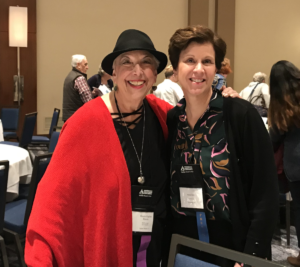
Marie with Sharon Kaplan Roszia at the American Adoption Congress conference.

